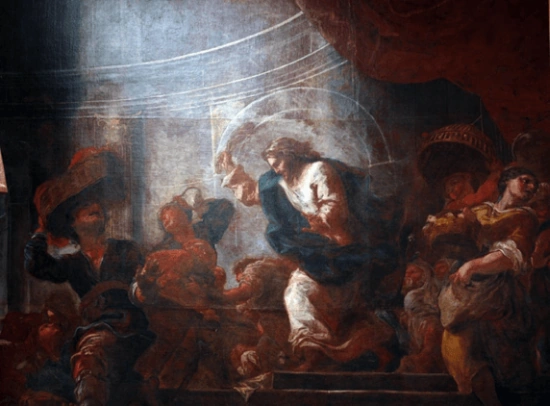1
Y viendo Raquel que no daba hijos a Jacob, tuvo envidia de su hermana, y decía a Jacob: Dame hijos, o si no, yo soy muerta.
2
Y Jacob se enojaba contra Raquel, y decía: ¿Soy yo en lugar de Dios, que te impidió el fruto de tu vientre?
3
Y ella dijo: He aquí mi sierva Bilha; entra a ella, y dará a luz sobre mis rodillas, y yo también tendré hijos de ella.
4
Así le dio a Bilha su sierva por mujer; y Jacob entró a ella.
5
Y concibió Bilha, y dio a luz un hijo a Jacob.
6
Y dijo Raquel: Me juzgó Dios, y también oyó mi voz, y me dio un hijo. Por tanto llamó su nombre Dan.
7
Y concibió otra vez Bilha, la sierva de Raquel, y dio a luz el hijo segundo a Jacob.
8
Y dijo Raquel: Con luchas de Dios he luchado con mi hermana, y he vencido. Y llamó su nombre Neftalí.
9
Y viendo Lea que había dejado de dar a luz, tomó a Zilpa su sierva, y la dio a Jacob por mujer.
10
Y Zilpa, sierva de Lea, dio a luz un hijo a Jacob.
11
Y dijo Lea: Vino la buena ventura. Y llamó su nombre Gad.
12
Y Zilpa, la sierva de Lea, dio a luz otro hijo a Jacob.
13
Y dijo Lea: Para hacerme bienaventurada; porque las mujeres me dirán bienaventurada; y llamó su nombre Aser.
14
Y fue Rubén en tiempo de la siega de los trigos, y halló mandrágoras en el campo, y las trajo a Lea su madre; y dijo Raquel a Lea: Te ruego que me des de las mandrágoras de tu hijo.
15
Y ella respondió: ¿Es poco que hayas tomado mi marido, sino que también te has de llevar las mandrágoras de mi hijo? Y dijo Raquel: Pues dormirá contigo esta noche por las mandrágoras de tu hijo.
16
Y cuando Jacob volvía del campo a la tarde, salió Lea a él, y le dijo: A mí has de entrar, porque a la verdad te he alquilado por las mandrágoras de mi hijo. Y durmió con ella aquella noche.
17
Y oyó Dios a Lea; y concibió, y dio a luz el quinto hijo a Jacob.
18
Y dijo Lea: Dios me ha dado mi salario, por cuanto di mi sierva a mi marido; por eso llamó su nombre Isacar.
19
Y concibió Lea otra vez, y dio a luz el sexto hijo a Jacob.
20
Y dijo Lea: Dios me ha dado buena dádiva; ahora morará conmigo mi marido, porque le he dado a luz seis hijos; y llamó su nombre Zabulón.
21
Y después dio a luz una hija, y llamó su nombre Dina.
22
Y se acordó Dios de Raquel, y la oyó Dios, y abrió su matriz.
23
Y concibió, y dio a luz un hijo; y dijo: Dios ha quitado mi vergüenza;
24
y llamó su nombre José, diciendo: Añádame el SEÑOR otro hijo.
25
Y aconteció, cuando Raquel dio a luz a José, que Jacob dijo a Labán: Envíame, e iré a mi lugar, y a mi tierra.
26
Dame mis mujeres y mis hijos, por las cuales he servido contigo, porque tú sabes el servicio que te he hecho.
27
Y Labán le respondió: Halle yo ahora gracia en tus ojos, he experimentado que el SEÑOR me ha bendecido por tu causa.
28
Y dijo: Señálame tu salario, que yo lo daré.
29
Y él respondió: Tú sabes cómo te he servido, y cuánto ha sido tu ganado conmigo;
30
porque poco tenías antes de mi venida , y ha crecido en multitud; y el SEÑOR te ha bendecido con mi entrada; y ahora ¿cuándo tengo de hacer yo también por mi propia casa?
31
Y él dijo: ¿Qué te daré? Respondió Jacob: No me des nada; si hicieres por mí esto, volveré a apacentar tus ovejas.
32
Yo pasaré hoy por todas tus ovejas, poniendo aparte toda oveja pintada y manchada, y todo carnero bermejo entre los carneros, y lo pintado y manchado entre las cabras; y esto será mi salario.
33
Así responderá por mí mi justicia mañana cuando me viniere mi salario delante de ti; todo lo que no fuere pintado ni manchado en las cabras y bermejo en las ovejas mías , se me ha de tener por de hurto.
34
Y dijo Labán: Mira, Deseo que fuese como tú dices.
35
Y apartó Labán aquel día los machos cabríos cinchados y manchados; y todas las cabras pintadas y manchadas, y todo lo que tenía en sí algo de blanco, y todo lo bermejo entre las ovejas, y las puso en la mano de sus hijos;
36
y puso tres días de camino entre sí y Jacob; y Jacob apacentaba las otras ovejas de Labán.
37
Luego tomó Jacob varas de álamo verdes, y de almendro, y de castaño, y descortezó en ellas mondaduras blancas, descubriendo así lo blanco de las varas.
38
Y puso las varas que había mondado en las pilas, en los abrevaderos del agua donde las ovejas venían a beber, delante de las ovejas, las cuales se calentaban viniendo a beber.
39
Y concebían las ovejas delante de las varas, y parían borregos cinchados, pintados y manchados.
40
Y apartaba Jacob los corderos, y los ponía con su rebaño, los cinchados, y todo lo que era bermejo en el hato de Labán. Y ponía su hato aparte, y no lo ponía con las ovejas de Labán.
41
Y sucedía que cuantas veces se calentaban las tempranas, Jacob ponía las varas delante de las ovejas en las pilas, para que concibiesen delante de las varas.
42
Y cuando venían las ovejas tardías, no las ponía; así eran las tardías para Labán, y las tempranas para Jacob.
43
Y se multiplicó el varón muchísimo, y tuvo muchas ovejas, y siervas y siervos, y camellos y asnos.








